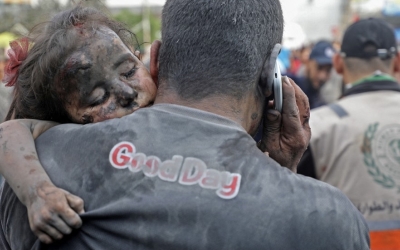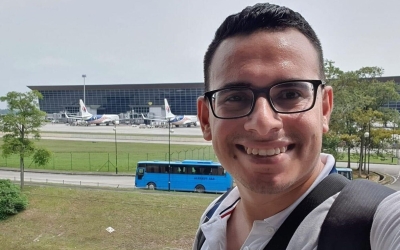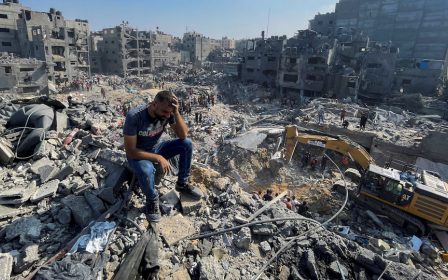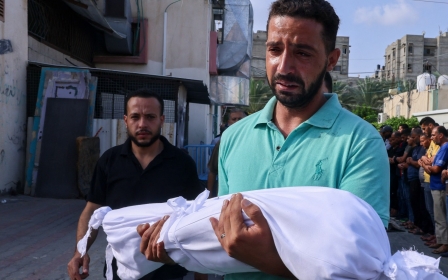War on Gaza: I am not Palestinian. But if you are not grieving, something is wrong
It is a cold, December evening in Cambridge, England. I have sat down at my desk in an attempt to make sense of something. I write within the atmosphere of overwhelming personal and collective grief that I have witnessed and experienced since the recent attack on Gaza.
My desk is comfortable. I am troubled only by the traffic noise outside my window, and the sound of students’ laughter as they stumble home from their festive jaunts, merry; cheeks and noses blushed from the cold, protected with the warmth of mulled wine.
Meanwhile, my best friend sleeps to the now-familiar sound of warplanes.
He feels the dread; I feel the dread - or come as close as I can to feeling the dread that I’ll never fully understand, regardless of the extent to which I empathise. Like many other Palestinians, he is - after a lifetime under a brutal military occupation - by now accustomed to this sound. (Can anyone ever be accustomed to such a sound?)
How to make sense of the dissonance - the multiple layers of guilt, both for the privilege I have to live in safety, writing these words as a student in one of the most prestigious universities in the world, and the immense unbridled grief that floods my being? I have a deep connection to Palestine. I have many friends and loved ones there. But I am not Palestinian.
New MEE newsletter: Jerusalem Dispatch
Sign up to get the latest insights and analysis on Israel-Palestine, alongside Turkey Unpacked and other MEE newsletters
So who am I to grieve?
Amid my ambivalence towards the pain I am undeniably experiencing, I am learning to recognise that this response, which feels excessive and indulgent, is in fact a sign of my humanity; my body’s innate function to empathise on a visceral level with those whose situation is infinitely crueller, more violent, and more precarious than my own, but still not beyond my impulse to grieve.
'Ungrievable lives'
In fact, our capacity to mourn lives that are distant from our own reveals a lot about who we are as people. As Judith Butler argues, "One way of posing the question of who 'we' are in these times of war is by asking whose lives are considered valuable, whose lives are mourned, and whose lives are ungrievable."
A video of a recent public speech delivered by Rashida Tlaib, a Palestinian-American Congresswoman, confirmed the importance of grieving over lives we have not known. In the speech, Tlaib recounted watching a video of traumatised Gazan children crying surrounded by the rubble of their homes, who were told "ma tabkii" - "don’t cry", in Arabic.
Follow Middle East Eye's live coverage for the latest on the Israel-Palestine war
At this point, Tlaib herself burst into tears, yelling emphatically, "Let them cry", before affirming that: "If you’re not crying, then something is wrong."
This sentiment stuck with me, as I tried to make sense of my grief and the grief of everyone around me who is in some way connected to the tragedy we are witnessing. Regardless of who we are or where we’re from, if we are not feeling outrage, distress and grief, then something is wrong, and we must question why we are not moved to action.
It is in the interest of the global powers to divide lives into those who can be mourned and those who cannot; those whose mourning justifies the military-industrial complex, and those whose mourning undermines it.
Therefore, we must reject this censorship of grief.
What many people do not realise is that this tragedy is universal, seeping into every corner of the globe as we witness genocide in real-time (yet many of us choose, still, to look away).
The horror is felt not only in Gaza, but in the entirety of the West Bank, where thousands of innocent civilians are being arrested en masse with no one to rally behind them, as the media’s empathy stretches only to "women and children" - as if the imprisonment, torture and murder of Palestinian men is inevitable; as if the bodies of Palestinian men are simply collateral.
And beyond the West Bank, to the Palestinians living in the cities of Haifa and Jaffa who are isolated; persecuted in their mourning because the bodies they mourn are deemed by the state as unmournable.
Endless cycle of trauma
Following Edward Said’s enquiry into who has the "permission to narrate" global events, we are obliged to ask: who has the permission to grieve?
In Mahmoud Darwish’s Yawmiyyat al-huzn al-'adi, translated by Ibrahim Muhawi into English as A Journal of Ordinary Grief, Darwish recounts the private grief that Palestinians living in Palestine ’48 are obliged to endure every year on the anniversary of the "War of Independence", when citizens are called upon to mourn the lives of Israeli soldiers lost in this war.
Meanwhile, Arabs must "Cry from within, or burst from pressure", because "The declaration of the birth of Israel is at the same time the declaration of the death of Palestine." While one form of grief is sanctioned - encouraged, even - another is "forbidden".
What I have found from responses to the unfolding violence, as well as the relentless images and stories of trauma that fill my ears, my newsfeed and my thoughts, is that - in contrast to Darwish’s playfully ironic description of Palestinian grief as "ordinary" in the aforementioned title of his work - there is nothing ordinary about Palestinian grief.
There is nothing ordinary about it because it defies the conventional pattern of grief, whereby a bad event, or series of events happen in which a sense of loss - actual or perceived - takes place.
The afflicted person or people experience(s) shock, anger, fear, sadness, denial, and so on, sometimes alternately and sometimes all at once. And then, they begin the slow, often painstaking process of "moving on" - a process not of getting over but getting on with the loss.
For Palestinians, on the other hand, the process of overcoming loss is severely complicated by the endless cycle of traumatic events to which they are subjected and the nature of life under occupation. There is no end to the traumatic event. Life, in itself, is a trauma; a process of continuous grieving - for the past, for the present, and for the future.
The same has been said of other oppressed groups, such as Black Americans, who according to Claudia Rankine, live "a life of mourning", by virtue of being Black in a country of endemic racism where "Americans assimilate [Black] corpses in their daily comings and goings".
It is this mainstream complacency towards the loss of Black life that leads Rankine to argue that "Our deaths inside a system of racism existed before we were born", a sentiment that rings true in the Palestinian context, both at home and abroad, where one can be shot in the street simply for being, or appearing to be, Palestinian.
Here I am thinking about the three Palestinians who were shot in Vermont, US, on 25 November, whilst they were wearing Palestinian headdresses, keffiyeh, as they walked near their university campus. In the "land of the free".
I recall Rankine’s discussion of Blackness in America here because the notion of living as mourning is similarly applicable to the Palestinian context, where to live is to grieve. This is not to say, of course, that Palestinians do not experience joy. But in between these moments of happiness, there is the consistent rhythm of grief.
Grief as a form of political action
If there is a point to grief, it is this: the opportunity to mobilise suffering as a mode of resistance to the violent circumstances from which it emerges. The opportunity that, in opening space for collective grieving - one in which we acknowledge and share one another’s pain - we can demand a better future; one in which to be born Palestinian does not mean to be born already dead.
If there is a point to grief, it is this: the opportunity to mobilise suffering as a mode of resistance to the violent circumstances from which it emerges
For Rankine, collective mourning is "a mode of intervention and interruption" that builds solidarity, and empathy, and demands a cold reckoning with the fact of racially motivated murders and the structures and conditions that facilitate impunity and allow them to happen.
For Palestinian writers such as Darwish, writing itself serves as a form of grieving that holds multiple possibilities. In his elegy for renowned Palestinian anticolonial scholar Edward Said, he suggests that it can “hold loss”; offer "a consolation"; and "invent a hope for speech/invent a direction, a mirage to extend hope".
While for many people, writing remains a luxury, the number of writers who have been censored, arrested, or even killed for their words (like the Palestinian resistance writer Ghassan Kanafani), testifies to the potential of words to influence action.
Responding to Said’s celebration of the "aesthetic as freedom", Darwish quips: "The life which cannot be defined / except by death is not a life."
It is imperative, then, that we supplement words with action; that we demand conditions where human dignity is respected and where Palestinian lives matter not only in death, as we measure statistics and calculate losses, but in life.
Where the right to life - and to a life worth living - is truly inalienable.
Securing this demand - the right to a dignified life - is not a footnote to a ceasefire. It is not a deferential request to be addressed at a later date, perhaps 75 years from now. It is not a wish, a hope, or a utopian vision, but a precondition for human survival.
Our grief is telling us something vital; it is upon us now to listen.
The views expressed in this article belong to the author and do not necessarily reflect the editorial policy of Middle East Eye.
Middle East Eye delivers independent and unrivalled coverage and analysis of the Middle East, North Africa and beyond. To learn more about republishing this content and the associated fees, please fill out this form. More about MEE can be found here.







